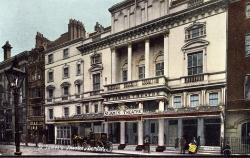Women and Leisure during the First World War – ‘An Essential Part of National Work’
Women and Leisure in the First World War: Project News
In his speech at the St James Theatre on 3 March 1917, Neville Chamberlain, then Director General of the Department of National Service, stated that ‘I do consider that the amusement of the people is an essential part of national work’ (The Stage Year Book, 1918).

St James’ Theatre, London, postcard view c.1910.
(from http://www.theatrestrust.org.uk/resources/images/show/164-faade-of-st-james-theatre-london)
The idea that ‘proper’ leisure activity was necessary to keep workers contributing effectively to the war effort was common by the end of the war. Our project considers the impact of changes in workplace structures which, as a result of male conscription, allowed women a range of new workplace opportunities. With these occupations – including those such as factory worker, nurse, and miner, journalist, and ambulance driver – newly and/or more widely available to women, and with disposable income, women had more access to leisure activities outside of the home.
Our project explores three key leisure activities in which women in the North East of England participated in much-increased numbers during the First World War: 1) sport; 2) theatre & performance; and 3) informal education & training. Working in partnership, co-investigators from Tyneside Women’s Health, the Women’s Institute, the Search Project and Newcastle University will identify how female leisure was remade during the War. Tyneside Women’s Health works with women with a history of mental illness from economically-deprived backgrounds; the Northumberland Women’s Institute’s members are largely from rural communities; and the Search Project is working with largely migrant elderly communities from economically-deprived urban areas.
Our participants will receive training in working with archival material, in ethical research practices, in oral histories, and in digital storytelling, and will work alongside a Research Assistant to gather selected archival materials into physical and digital exhibitions. They will work with a local theatre company (Cap-a-Pie) to develop performance workshops. Through these outputs, our project will reflect on how the process of investigating these activities and communities can be relevant to a contemporary audience.
